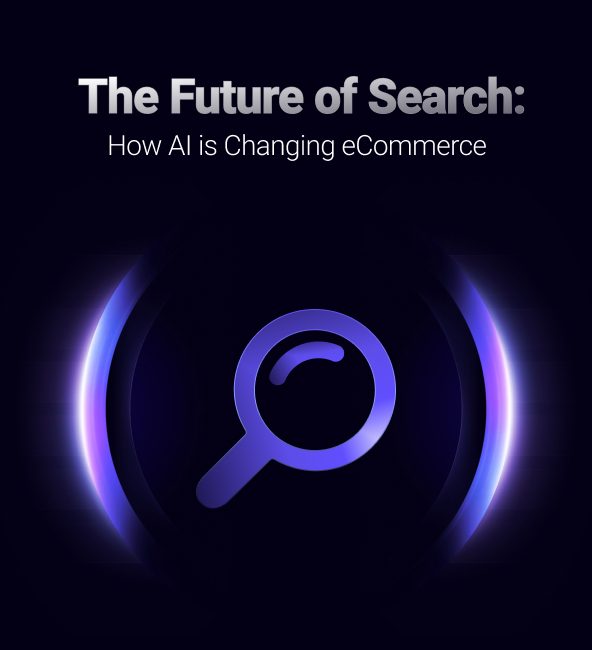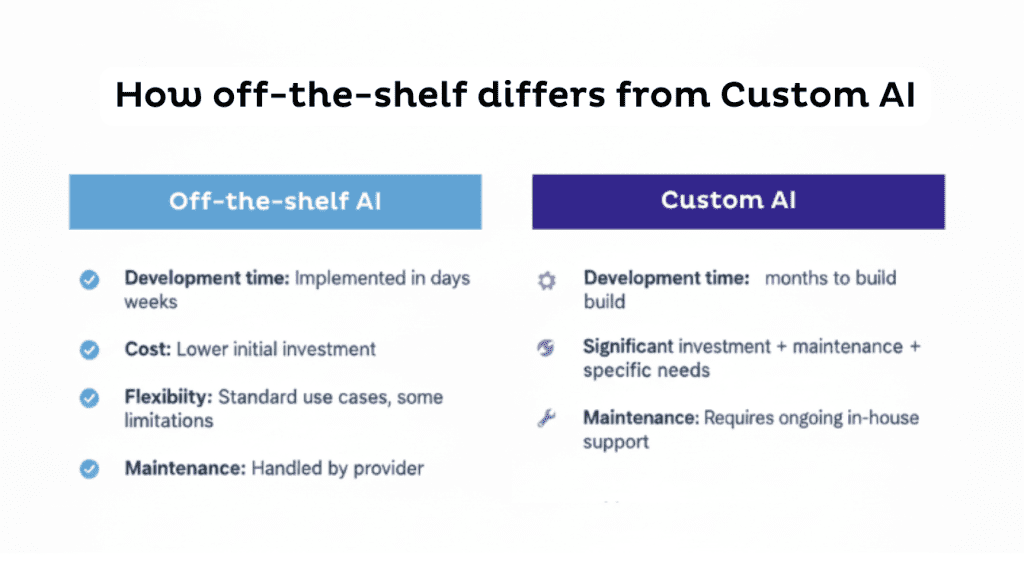In today’s e-commerce world, speed, accuracy, and personalization can make or break the customer experience. Off-the-shelf AI makes it easy to tap into powerful tools that boost everything from recommendations to customer support—without spending months (or a fortune) building something from scratch.
Sure, custom AI can be super tailored, but it usually takes a lot of time, money, and technical know-how. Off-the-shelf options give you a faster, more flexible way to put AI to work in your business right now.
Whether you’re running a small boutique or growing a busy online store, getting to know off-the-shelf AI can help you make smarter tech choices and deliver smoother, more personalized experiences your customers will love.
What is Off-the-Shelf AI
Off-the-shelf AI refers to pre-built artificial intelligence solutions that businesses can implement immediately, without the need to develop custom algorithms from scratch. These solutions are designed to solve common business problems—such as improving search, personalizing recommendations, or analyzing customer behavior—right out of the box.
Doofinder is a strong example of an AI solution that combines off-the-shelf convenience with custom flexibility. It provides a ready-to-use search and discovery tools that online stores can implement immediately to tackle common e-commerce challenges—such as understanding customer intent, delivering relevant recommendations, and enabling visual or voice search—right out of the box.
At the same time, Doofinder also offers customizable options that allow businesses to tailor its features and integrations to their specific needs, ensuring a search experience that aligns with their unique goals and customer journeys.
Fact: Off-the-shelf AI solutions can often be implemented in days or weeks, compared to the months it typically takes to develop custom AI. This fast deployment allows businesses to start improving search, personalization, and customer experience almost immediately.

Definition and Key Features
Key characteristics of off-the-shelf AI include:
- Pre-built functionality: Comes with ready-to-use features designed to address common business needs without requiring extensive development.
- Quick deployment: Can be implemented rapidly, often with minimal configuration or integration work.
- Scalability: Built to serve a wide range of users and industries, allowing easy scaling as usage grows.
- Lower upfront cost: Typically more affordable than custom-built solutions since development and training are already completed.
- Limited customization: Offers some configuration options but may not fully adapt to highly specific workflows or niche use cases.
These features allow businesses of all sizes to implement sophisticated AI solutions quickly and efficiently.
How It Differs from Custom AI
While off-the-shelf AI is ready to use, custom AI is built specifically for a business’s unique needs. The differences include:
- Development time: Custom AI can take months to build, whereas off-the-shelf AI can be implemented in days or weeks.
- Cost: Custom solutions require significant investment in development and maintenance.
- Flexibility: Custom AI can be tailored for very specific use cases, but off-the-shelf AI may have limitations.
- Maintenance: Updates for off-the-shelf AI are handled by the provider, whereas custom AI requires ongoing in-house support.
By understanding these distinctions, businesses can choose the solution that balances speed, cost, and customization needs.

Benefits of Off-the-Shelf AI
Off-the-shelf AI provides businesses with advanced capabilities quickly and efficiently. It allows companies to leverage artificial intelligence without investing heavily in development or technical expertise.
Here’s a list of some of the main benefits:
Quick Implementation and Ease of Use
One of the biggest advantages of off-the-shelf AI is its speed to deployment. Businesses can start using advanced search, recommendation engines, or analytics within days or weeks, rather than the months often required for custom AI. This fast implementation helps companies respond quickly to market trends and customer needs.
Cost and Resource Efficiency
Developing AI from scratch can cost tens or even hundreds of thousands of dollars, not to mention the specialized personnel required to build and maintain it. Off-the-shelf AI reduces both financial and human resource burdens, making sophisticated AI accessible even for smaller businesses.
According to industry reports, over 60% of mid-sized retailers adopt pre-built AI solutions primarily to save on costs and reduce implementation complexity.
Reliable and Scalable for Growing Stores
Pre-built AI tools are designed to handle large volumes of data and traffic, making them suitable for businesses that expect to grow. Studies show that even a 100-millisecond delay in search results can reduce conversion rates by up to 7%, so fast, reliable AI systems are critical.
Off-the-shelf solutions ensure performance remains consistent as catalogs expand and traffic increases, without requiring additional infrastructure.
Downsides of Off-the-Shelf AI
While off-the-shelf AI offers speed, cost efficiency, and scalability, it is not without its limitations. Understanding these drawbacks helps businesses make informed decisions and avoid potential pitfalls.
Limited Customization
Off-the-shelf AI is designed to solve common problems across many industries. While this makes it versatile, it also means the solution may not fully meet highly specific business needs.
For example, retailers with unique product catalogs, specialized requirements, or proprietary algorithms might find that pre-built AI cannot accommodate every workflow. Custom features or behaviors can’t always be added, limiting the ability to differentiate the user experience.
How Doofinder Fits: Doofinder offers flexible configuration options within its off-the-shelf framework. Features like boosting rules, faceted filtering, and personalized recommendations allow merchants to tailor the search experience to their catalog and business goals without needing fully custom AI development.
Potential Integration Challenges
Even though most off-the-shelf AI tools are designed to be compatible with common platforms, integrating them into existing systems can sometimes be more complicated than expected. Businesses may face technical hurdles when connecting the AI to e-commerce platforms, CRMs, or analytics dashboards.
In some cases, IT support or developer assistance is required to ensure seamless operation, which can reduce the “plug-and-play” convenience that initially attracted companies to the solution.
A simple way to gauge implementation difficulty is to check the CMS or e-commerce platform’s app store. Platforms often provide ratings, reviews, and installation guides for AI plugins or integrations. High ratings, positive feedback, and clear documentation usually indicate the solution can be implemented quickly and with minimal technical effort, helping businesses make informed decisions before committing resources.
Dependence on the Provider
When using off-the-shelf AI, your business relies on the provider for updates, bug fixes, and new features. If the vendor slows development, discontinues support, or changes pricing structures, your operations could be affected. This dependence also means that your ability to innovate or customize the AI’s functionality is limited, as the roadmap and priorities are determined by the provider, not your business.
Examples and Use Cases of Off-the-Shelf AI in Action
Off-the-shelf AI solutions are used in a variety of business applications across industries. Here are some common ways companies leverage pre-built AI to improve operations and customer experiences:
E-Commerce Search and Recommendations
Many online stores use off-the-shelf AI to improve product discovery. These solutions can understand customer intent, handle typos, and suggest relevant products in real time. For example, AI-powered search engines can deliver personalized results based on browsing history or purchase patterns, helping increase conversion rates.
Studies indicate that personalized recommendations can drive up to 35% of e-commerce revenue.
Customer Support and Chatbots
Off-the-shelf AI chatbots can automate customer interactions, answering common questions and resolving simple issues without human intervention. These tools help reduce response times and free up customer support teams to focus on more complex inquiries. According to IBM, businesses using AI chatbots can save up to 30% on customer support costs.
KLM adopted DigitalGenius, an off-the-shelf AI platform integrated with Salesforce, to automate customer support. The system reads incoming messages, suggests replies, and automates routine queries. After deployment, KLM automated up to 50% of repetitive questions, improving response times while maintaining brand tone—all without custom model training.
Predictive Analytics
Pre-built AI solutions can analyze customer behavior and predict trends, such as which products are likely to sell or when inventory might run low. Retailers and marketplaces use these insights to optimize inventory, promotions, and pricing strategies, improving efficiency and profitability.
Pre-built AI analytics tools—like Salesforce Einstein, HubSpot Predictive Lead Scoring, or Google Cloud Vertex AI Forecasting—help businesses anticipate customer behavior, forecast demand, and optimize pricing or inventory. For example, a retailer might use predictive models to plan stock levels ahead of seasonal peaks.
Image and Voice Recognition
Some off-the-shelf AI tools allow customers to search by image or voice, making shopping faster and more intuitive. For example, a customer could upload a photo of a product they like, and the AI would identify visually similar items in the store’s catalog.
This type of feature has been shown to increase engagement and reduce bounce rates in online stores.
Marketing Automation
AI can also be used to segment customers, personalize marketing campaigns, and recommend content automatically. Off-the-shelf AI solutions make it easier to implement targeted campaigns without complex setup, improving email open rates, click-through rates, and overall campaign performance.
AI-powered marketing platforms like Mailchimp, HubSpot, and Adobe Marketo Engage use off-the-shelf machine learning to segment audiences, recommend content, and automate campaign optimization. This allows brands to deliver more relevant messages at scale without custom AI development.
With Klaviyo, you can use Doofinder to personalize email marketing using AI. The quick integration allows you to send automated emails to customers leveraging their specific browsing behavior.

How Doofinder Combines Off-the-Shelf and Custom AI
Doofinder occupies a unique space between traditional off-the-shelf and fully custom AI solutions. While it provides the ease of deployment, scalability, and reliability expected from a pre-built AI tool, it also offers advanced configurability and control that allow merchants to tailor the search experience to their specific catalogs and business goals.
Features like boosting rules, faceted filtering, and personalized recommendations give stores the precision and flexibility of custom AI without the time, cost, and technical complexity typically required for fully bespoke solutions. In this way, Doofinder combines the best of both worlds, offering an AI-powered search engine that is both ready-to-use and highly adaptable, making it suitable for a wide range of e-commerce businesses.

Frequently Asked Questions
The security of off-the-shelf AI depends on the provider. Reputable solutions implement robust measures such as data encryption, secure servers, and access controls to protect sensitive information. When you’re picking an AI solution, it’s important you also verify that the AI complies with relevant regulations, like GDPR in Europe or CCPA in California, to ensure both legal compliance and customer trust.
Most off-the-shelf AI tools are designed to integrate with popular platforms such as e-commerce systems, CRMs, and analytics dashboards. Before adopting a solution, it’s useful to check the platform’s app marketplace or documentation, which often provides installation guides, compatibility info, and user reviews. This helps gauge how smoothly the AI will connect with your current systems.
One of the main advantages of off-the-shelf AI is its accessibility. These solutions are generally user-friendly and require minimal technical knowledge, especially if they include plugins, setup wizards, or customer support. This makes them ideal for businesses without in-house AI or development teams.
The effectiveness of AI can be tracked using key performance indicators (KPIs) such as:
- Search accuracy and relevance – are customers finding the products they want?
- Conversion rates and sales impact – does AI drive more purchases?
- Customer engagement metrics – including click-through rates, bounce rates, and time on site.
- Average order value or revenue per visitor – indicating upselling or cross-selling success.
Many off-the-shelf AI tools provide built-in dashboards and analytics, allowing businesses to monitor these metrics in real time and make data-driven optimizations.


